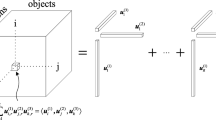Abstract
Temporal knowledge graphs allow to store process data in a natural way since they also model the time aspect. An example for such data are registration processes in the area of intellectual property protection. A common question in such settings is to predict the future behavior of a (yet unfinished) process. However, traditional process mining techniques require structured data, which is typically not available in this form in such communication-intensive domains. In addition, there exists a number of knowledge graph embedding methods based on neural networks, which are too performance-demanding for large real-world graphs. In this paper, we propose several extensions for preprocessing process data that will be embedded in the traditional triple-based TransE knowledge graph embedding model to predict process behavior in temporal knowledge graphs. We evaluate our approach by means of a real-world trademark registration process in a patent office and show its improved performance compared to the TransE base model.
Access this chapter
Tax calculation will be finalised at checkout
Purchases are for personal use only
Similar content being viewed by others
References
Aalst, W.M.P.: Object-centric process mining: dealing with divergence and convergence in event data. In: Ölveczky, P.C., Salaün, G. (eds.) SEFM 2019. LNCS, vol. 11724, pp. 3–25. Springer, Cham (2019). https://doi.org/10.1007/978-3-030-30446-1_1
Weidlich, M., et al.: Process mining manifesto. In: Daniel, F., Barkaoui, K., Dustdar, S. (eds.) BPM 2011. LNBIP, vol. 99, pp. 169–194. Springer, Heidelberg (2012). https://doi.org/10.1007/978-3-642-28108-2_19
Ali, M., et al.: Pykeen 1.0: A python library for training and evaluating knowledge graph embeddings (2020)
Breuker, D., Matzner, M., Delfmann, P., Becker, J.: Comprehensible predictive models for business processes. MIS Q. 40(4), 1009–1034 (2016)
Evermann, J., Rehse, J.R., Fettke, P.: Predicting process behaviour using deep learning. Decis. Support Syst. 100, 129–140 (2017)
García-Durán, A., Bordes, A., Usunier, N.: Composing Relationships with Translations. Technical report, CNRS, Heudiasyc (2015)
Hoyt, C.T., Berrendorf, M., Gaklin, M., Tresp, V., Gyori, B.M.: A unified framework for rank-based evaluation metrics for link prediction in knowledge graphs (2022)
Hübscher, G., et al.: Graph-based managing and mining of processes and data in the domain of intellectual property. Inf. Syst. 106, 101844 (2022)
Hübscher, G., Geist, V., Auer, D., Hübscher, N., Küng, J.: Representation and presentation of knowledge and processes-an integrated approach for a dynamic communication-intensive environment. In: IJWIS (2021)
Li, Y., Qin, D., Yang, X.: Path modeling based on entity-connectivity for knowledge base completion. In: ICISCE, pp. 984–989. IEEE (2020)
Lin, Y., Liu, Z., Luan, H., Sun, M., Rao, S., Liu, S.: Modeling relation paths for representation learning of knowledge bases (2015). arXiv preprint arXiv:1506.00379
Liu, F., Shen, Y., Zhang, T., Gao, H.: Entity-related paths modeling for knowledge base completion. Front. Comp. Sci. 14(5), 1–10 (2020). https://doi.org/10.1007/s11704-019-8264-4
Márquez-Chamorro, A.E., Resinas, M., Ruiz-Cortés, A.: Predictive monitoring of business processes: a survey. IEEE Trans. Serv. Comput. 11(6), 962–977 (2017)
Trivedi, R., Dai, H., Wang, Y., Song, L.: Know-evolve: deep temporal reasoning for dynamic knowledge graphs. In: ICML, pp. 3462–3471. PMLR (2017)
Zhang, M., Wang, Q., Xu, W., Li, W., Sun, S.: Discriminative path-based knowledge graph embedding for precise link prediction. In: Pasi, G., Piwowarski, B., Azzopardi, L., Hanbury, A. (eds.) ECIR 2018. LNCS, vol. 10772, pp. 276–288. Springer, Cham (2018). https://doi.org/10.1007/978-3-319-76941-7_21
Acknowledgements
The research reported in this paper has been funded by BMK, BMDW, and the State of Upper Austria in the frame of the COMET Programme managed by FFG, and in particular by the FFG BRIDGE project KnoP-2D (grant no. 871299) and the COMET module S3AI (grant no. 872172).
Author information
Authors and Affiliations
Corresponding author
Editor information
Editors and Affiliations
Rights and permissions
Copyright information
© 2022 The Author(s), under exclusive license to Springer Nature Switzerland AG
About this paper
Cite this paper
Karetnikov, A., Ehrlinger, L., Geist, V. (2022). Enhancing TransE to Predict Process Behavior in Temporal Knowledge Graphs. In: Kotsis, G., et al. Database and Expert Systems Applications - DEXA 2022 Workshops. DEXA 2022. Communications in Computer and Information Science, vol 1633. Springer, Cham. https://doi.org/10.1007/978-3-031-14343-4_34
Download citation
DOI: https://doi.org/10.1007/978-3-031-14343-4_34
Published:
Publisher Name: Springer, Cham
Print ISBN: 978-3-031-14342-7
Online ISBN: 978-3-031-14343-4
eBook Packages: Computer ScienceComputer Science (R0)




